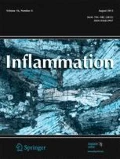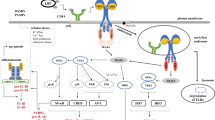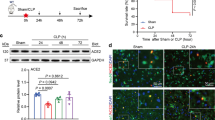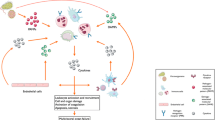Abstract
Dendritic cells (DCs) are vital antigen-presenting cells (APCs) in the immune system, whose apoptosis is closely related to the development of sepsis. Mitophagy is one of the necessary forms of selective autophagy that removes damaged or dysfunctional mitochondria to regulate immunity and inflammation. However, its effect on the apoptosis of DC in sepsis remains unknown. Here, we showed that sepsis activated the apoptosis and mitophagy of DC, and mitophagy had an anti-apoptotic effect on sepsis-induced DC apoptosis. In this study, we used cecal ligation and puncture (CLP) to simulate the pathophysiological state of sepsis. Apoptosis and mitophagy of DC were significantly enhanced in CLP mice compared with controls, and in the Pink1-KO (Pink1-knockout) mice CLP model, the level of apoptosis in DC was further increased while the level of mitophagy was decreased. In addition, more severe mitochondrial dysfunction was exhibited in DC of Pink1-KO mice CLP model compared to wild-type (WT) mice. The results suggest that Pink1/Parkin-mediated mitophagy is activated during sepsis and has an anti-apoptotic effect on DC, which regulates immune functions.





Similar content being viewed by others
Availability of Data and Materials
All data generated or analyzed during this study are included in this published article.
Code Availability
Not applicable.
References
Singer, M., C.S. Deutschman, C.W. Seymour, M. Shankar-Hari, D. Annane, M. Bauer, et al. 2016. The Third International Consensus Definitions for Sepsis and Septic Shock (Sepsis-3). JAMA 315 (8): 801–810.
Venet, F., and G. Monneret. 2018. Advances in the understanding and treatment of sepsis-induced immunosuppression. Nature Reviews. Nephrology 14 (2): 121–137.
Delano, M.J., and P.A. Ward. 2016. Sepsis-induced immune dysfunction: Can immune therapies reduce mortality? The Journal of Clinical Investigation. 126 (1): 23–31.
Cao, C., M. Yu, and Y. Chai. 2019. Pathological alteration and therapeutic implications of sepsis-induced immune cell apoptosis. Cell Death and Disease. 10 (10): 782.
Luan, Y.Y., Y.M. Yao, X.Z. Xiao, and Z.Y. Sheng. 2015. Insights into the apoptotic death of immune cells in sepsis. Journal of Interferon Cytokine Research. 35 (1): 17–22.
Springer, M.Z., and K.F. Macleod. 2016. In Brief: Mitophagy: Mechanisms and role in human disease. Journal of Pathology. 240 (3): 253–255.
Youle, R.J., and D.P. Narendra. 2011. Mechanisms of mitophagy. Nature Reviews Molecular Cell Biology. 12 (1): 9–14.
Geisler, S., K.M. Holmstrom, D. Skujat, F.C. Fiesel, O.C. Rothfuss, P.J. Kahle, et al. 2010. PINK1/Parkin-mediated mitophagy is dependent on VDAC1 and p62/SQSTM1. Nature Cell Biology. 12 (2): 119–131.
Dorn, G.W. 2016. Parkin-dependent mitophagy in the heart. Journal of Molecular and Cellular Cardiology 95: 42–49.
Bernardini, J.P., M. Lazarou, and G. Dewson. 2017. Parkin and mitophagy in cancer. Oncogene 36 (10): 1315–1327.
Shen, Z., Y. Zheng, J. Wu, Y. Chen, X. Wu, Y. Zhou, et al. 2017. PARK2-dependent mitophagy induced by acidic postconditioning protects against focal cerebral ischemia and extends the reperfusion window. Autophagy 13 (3): 473–485.
Luo, Y., A. Hoffer, B. Hoffer, and X. Qi. 2015. Mitochondria: A Therapeutic Target for Parkinson’s Disease? International Journal of Molecular Sciences 16 (9): 20704–20730.
Kang, R., L. Zeng, Y. Xie, Z. Yan, B. Zhou, L. Cao, et al. 2016. A novel PINK1- and PARK2-dependent protective neuroimmune pathway in lethal sepsis. Autophagy 12 (12): 2374–2385.
Piquereau, J., R. Godin, S. Deschênes, V.L. Bessi, M. Mofarrahi, S.N. Hussain, et al. 2013. Protective role of PARK2/Parkin in sepsis-induced cardiac contractile and mitochondrial dysfunction. Autophagy 9 (11): 1837–1851.
Bell, C., L. English, J. Boulais, M. Chemali, O. Caron-Lizotte, M. Desjardins, et al. 2013. Quantitative proteomics reveals the induction of mitophagy in tumor necrosis factor-α-activated (TNFα) macrophages. Molecular and Cellular Proteomics 12 (9): 2394–2407.
Zhu, X.M., N. Dong, Y.B. Wang, Q.H. Zhang, Y. Yu, Y.M. Yao, et al. 2017. The involvement of endoplasmic reticulum stress response in immune dysfunction of dendritic cells after severe thermal injury in mice. Oncotarget 8 (6): 9035–9052.
Luan, Y.Y., R.Q. Yao, S. Tong, N. Dong, Z.Y. Sheng, and Y.M. Yao. 2016. Effect of tumor necrosis factor-α induced protein 8 like-2 on immune function of dendritic cells in mice following acute insults. Oncotarget 7 (21): 30178–30192.
Smyth, L.A., D.A. Boardman, S.L. Tung, R. Lechler, and G. Lombardi. 2015. MicroRNAs affect dendritic cell function and phenotype. Immunology 144 (2): 197–205.
Bhattacharya, A., X. Parillon, S. Zeng, S. Han, and N.T. Eissa. 2014. Deficiency of autophagy in dendritic cells protects against experimental autoimmune encephalomyelitis. Journal of Biological Chemistry 289 (38): 26525–26532.
Zhang, H., L. Zheng, J. Chen, M. Fukata, R. Ichikawa, D.Q. Shih, et al. 2017. The protection role of Atg16l1 in CD11c(+)dendritic cells in murine colitis. Immunobiology 222 (7): 831–841.
Reed, M., S.H. Morris, S. Jang, S. Mukherjee, Z. Yue, and N.W. Lukacs. 2013. Autophagy-inducing protein beclin-1 in dendritic cells regulates CD4 T cell responses and disease severity during respiratory syncytial virus infection. The Journal of Immunology 191 (5): 2526–2537.
D’Eliseo, D., L. Di Renzo, A. Santoni, and F. Velotti. 2017. Docosahexaenoic acid (DHA) promotes immunogenic apoptosis in human multiple myeloma cells, induces autophagy and inhibits STAT3 in both tumor and dendritic cells. Genes & Cancer 8 (1–2): 426–437.
Oami, T., E. Watanabe, M. Hatano, S. Sunahara, L. Fujimura, A. Sakamoto, et al. 2017. Suppression of T Cell Autophagy Results in Decreased Viability and Function of T Cells Through Accelerated Apoptosis in a Murine Sepsis Model. Critical Care Medicine 45 (1): e77–e85.
Kushwah, R., and J. Hu. 2010. Dendritic cell apoptosis: Regulation of tolerance versus immunity. The Journal of Immunology. 185 (2): 795–802.
Chien, W.S., Y.H. Chen, P.C. Chiang, H.W. Hsiao, S.M. Chuang, S.I. Lue, et al. 2011. Suppression of autophagy in rat liver at late stage of polymicrobial sepsis. Shock 35 (5): 506–511.
Lalazar, G., G. Ilyas, S.A. Malik, K. Liu, E. Zhao, M. Amir, et al. 2016. Autophagy confers resistance to lipopolysaccharide-induced mouse hepatocyte injury. American Journal of Physiology. Gastrointestinal and Liver Physiology 311 (3): G377-386.
Kim, M.J., S.H. Bae, J.C. Ryu, Y. Kwon, J.H. Oh, J. Kwon, et al. 2016. SESN2/sestrin2 suppresses sepsis by inducing mitophagy and inhibiting NLRP3 activation in macrophages. Autophagy 12 (8): 1272–1291.
Wang, Y., X. Mao, H. Chen, J. Feng, M. Yan, Y. Wang, et al. 2019. Dexmedetomidine alleviates LPS-induced apoptosis and inflammation in macrophages by eliminating damaged mitochondria via PINK1 mediated mitophagy. International Immunopharmacology. 73: 471–481.
Buras, J.A., B. Holzmann, and M. Sitkovsky. 2005. Animal models of sepsis: Setting the stage. Nature Reviews Drug Discovery. 4 (10): 854–865.
Rittirsch, D., M.S. Huber-Lang, M.A. Flierl, and P.A. Ward. 2009. Immunodesign of experimental sepsis by cecal ligation and puncture. Nature Protocols. 4 (1): 31–36.
Balan, S., M. Saxena, and N. Bhardwaj. 2019. Dendritic cell subsets and locations. International Review of Cell and Molecular Biology 348: 1–68.
Tinsley, K.W., M.H. Grayson, P.E. Swanson, A.M. Drewry, K.C. Chang, I.E. Karl, et al. 2003. Sepsis induces apoptosis and profound depletion of splenic interdigitating and follicular dendritic cells. The Journal of Immunology 171 (2): 909–914.
Kushwah, R., J. Wu, J.R. Oliver, G. Jiang, J. Zhang, K.A. Siminovitch, et al. 2010. Uptake of apoptotic DC converts immature DC into tolerogenic DC that induce differentiation of Foxp3+ Treg. European Journal of Immunology. 40 (4): 1022–1035.
O’Sullivan, T.E., L.R. Johnson, H.H. Kang, and J.C. Sun. 2015. BNIP3- and BNIP3L-Mediated Mitophagy Promotes the Generation of Natural Killer Cell Memory. Immunity 43 (2): 331–342.
Larson-Casey, J.L., J.S. Deshane, A.J. Ryan, V.J. Thannickal, and A.B. Carter. 2016. Macrophage Akt1 Kinase-Mediated Mitophagy Modulates Apoptosis Resistance and Pulmonary Fibrosis. Immunity 44 (3): 582–596.
Wu, D.D., T. Li, and X.Y. Ji. 2017. Dendritic Cells in Sepsis: Pathological Alterations and Therapeutic Implications. Journal of Immunology Research. 2017: 3591248.
Lewis, A.J., T.R. Billiar, and M.R. Rosengart. 2016. Biology and Metabolism of Sepsis: Innate Immunity, Bioenergetics, and Autophagy. Surgical Infections 17 (3): 286–293.
Yin, X., H. Xin, S. Mao, G. Wu, and L. Guo. 2019. The Role of Autophagy in Sepsis: Protection and Injury to Organs. Frontiers in physiology. 10: 1071.
Lazarou, M. 2015. Keeping the immune system in check: A role for mitophagy. Immunology and Cell Biology. 93 (1): 3–10.
Wang, Y., N. Liu, and B. Lu. 2019. Mechanisms and roles of mitophagy in neurodegenerative diseases. CNS Neuroscience Therapeutics. 25 (7): 859–875.
Sun, Y., X. Yao, Q. Zhang, M. Zhu, Z. Liu, B. Ci, et al. 2018. Beclin-1-Dependent Autophagy Protects the Heart During Sepsis. Circulation 138 (20): 2247–2262.
Huang, X., F. Venet, C. Chung, J. Lomas-Neira and A. Ayala. 2007. Changes in dendritic cell function in the immune response to sepsis. Cell- & tissue-based therapy. Expert Opinion On Biological Therapy. 7(7): 929–938.
Tang, C., H. Han, M. Yan, S. Zhu, J. Liu, Z. Liu, et al. 2018. PINK1-PRKN/PARK2 pathway of mitophagy is activated to protect against renal ischemia-reperfusion injury. Autophagy 14 (5): 880–897.
Parganlija, D., M. Klinkenberg, J. Dominguez-Bautista, M. Hetzel, S. Gispert, M.A. Chimi, et al. 2014. Loss of PINK1 impairs stress-induced autophagy and cell survival. PLOS One. 9(4): e95288.
Tsubouchi, K., J. Araya, and K. Kuwano. 2018. PINK1-PARK2-mediated mitophagy in COPD and IPF pathogeneses. Inflammation and Regeneration. 38: 18.
Nagar, H., S. Piao, and C. Kim. 2018. Role of Mitochondrial Oxidative Stress in Sepsis. Acute and critical care. 33 (2): 65–72.
Estaquier, J., F. Vallette, J.L. Vayssiere, and B. Mignotte. 2012. The mitochondrial pathways of apoptosis. Advances in Experimental Medicine and Biology 942: 157–183.
Wu, Y., Y.M. Yao, and Z.Q. Lu. 2019. Mitochondrial quality control mechanisms as potential therapeutic targets in sepsis-induced multiple organ failure. Journal of Molecular Medicine (Berlin, Germany) 97 (4): 451–462.
Lin, Q., S. Li, N. Jiang, X. Shao, M. Zhang, H. Jin, et al. 2019. PINK1-parkin pathway of mitophagy protects against contrast-induced acute kidney injury via decreasing mitochondrial ROS and NLRP3 inflammasome activation. Redox Biology. 26.
Zhi, L., Q. Qin, T. Muqeem, E.L. Seifert, W. Liu, S. Zheng, et al. 2019. Loss of PINK1 causes age-dependent decrease of dopamine release and mitochondrial dysfunction. Neurobiology of Aging. 75: 1–10.
Gandhi, S., A. Wood-Kaczmar, Z. Yao, H. Plun-Favreau, E. Deas, K. Klupsch, et al. 2009. PINK1-Associated Parkinson’s Disease Is Caused by Neuronal Vulnerability to Calcium-Induced Cell Death. Molecular Cell. 33 (5): 627–638.
Marongiu, R., B. Spencer, L. Crews, A. Adame, C. Patrick, M. Trejo, et al. 2009. Mutant Pink1 induces mitochondrial dysfunction in a neuronal cell model of Parkinson’s disease by disturbing calcium flux. Journal of Neurochemistry. 108 (6): 1561–1574.
Acknowledgements
We thank other members of our laboratories for helpful discussion and comments.
Funding
This work was supported by the National Natural Science Foundation of China (grant numbers 81772112).
Author information
Authors and Affiliations
Contributions
Yaolu Zhang, Longwang Chen, and Yinan Luo contributed equally to this work. Yinan Luo, Yongming Yao, and Zhongqiu Lu designed the research. Yaolu Zhang, Longwang Chen, Yinan Luo, Kang Wang, Xinyong Liu, and Zhong Xiao performed the research. Yaolu Zhang, Longwang Chen, Yinan Luo, Kang Wang, Xinyong Liu, Zhong Xiao, and Guangju Zhao analyzed the data. Longwang Chen and Guangju Zhao contributed reagents. Yaolu Zhang and Longwang Chen wrote the paper.
Corresponding authors
Ethics declarations
Ethics Approval
All studies were performed according to the National Institutes of Health Guide for the Care and Use of Laboratory Animals, and all methods were authorized by the ethics committee of the Laboratory Animal Ethics Committee of Wenzhou Medical University.
Consent for Publication
Written informed consent for publication was obtained from all participants.
Consent to Participate
Written informed consent for participation was obtained from all participants.
Conflict of Interest
The authors declare no competing interests.
Additional information
Publisher's Note
Springer Nature remains neutral with regard to jurisdictional claims in published maps and institutional affiliations.
Rights and permissions
About this article
Cite this article
Zhang, Y., Chen, L., Luo, Y. et al. Pink1/Parkin-Mediated Mitophagy Regulated the Apoptosis of Dendritic Cells in Sepsis. Inflammation 45, 1374–1387 (2022). https://doi.org/10.1007/s10753-022-01628-x
Received:
Revised:
Accepted:
Published:
Issue Date:
DOI: https://doi.org/10.1007/s10753-022-01628-x




